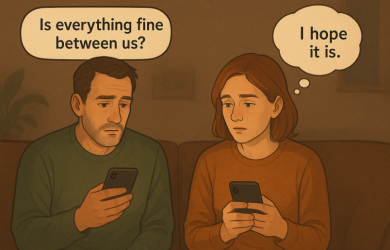3 Expert Tips to Improve Emotional Connection With Your Partner

Unlock Daily 30-Sec Tips for a Happier Relationship
👉 Subscribe FREEKey Takeaways
Marriage.com AI Quick Summary
On the long list of reasons that make relationships fail, lack of intimacy is perhaps the most difficult to overcome.
A relationship works when both partners allow themselves to be vulnerable and lay bare their real personalities — those hopes, dreams, and fears that may seem easier to sweep under the rug.
However, many couples experience a lack of emotional connection due to psychological vulnerabilities and baggage.
In a recent article for The Good Men Project, writer Jordan Gray tackles the relationship killer – fear of intimacy – head-on. He details a body of work with clients (and his own experience) that makes his belief that “intimacy can be downright terrifying” ring especially true.
But as with any challenge that threatens the emotional health and stability of a happy couple, Gray suggests that the problem of shared intimacy can be conquered.
By “learning to choose vulnerability and letting someone see you for who you are,” Gray writes, “you will gain access to a world of fulfillment, joy, creativity, and blissful love.”
Turning toward one another can enhance love
According to American researcher Dr. John Gottman, who is known for his work on marital stability, couples who want to strengthen emotional intimacy and deepen their love, need to turn towards each other.
“In The Science of Trust, Dr. Gottman explains that practicing emotional attunement while relaxing together can help you stay connected despite your differences. This means turning towards one another by showing empathy, responding appropriately to bids for connection, and not being defensive.”
“Asking your partner open-ended questions is also a great way to increase emotional closeness. If you ask questions that require a yes or no answer, you’re closing the door to intimate dialogue. In other words, take your time and make love to your partner with words.”
Jessica and Ryan’s emotional connect
Jessica and Ryan’s story demonstrates the importance of being able to turn toward your partner when they make a bid for connection. When Jessica met Ryan, she was not sure she was ready to fall in love again since she had only been divorced for two years.
What won her over were the ways he responded to her overtures and made her feel appreciated. This was especially important to her because her first husband often gave her the silent treatment when she initiated a bid for connection, such as talking about their day or going for a walk together.
Jessica says, “Ryan treated me well from the beginning, and I recall that I could tell by his facial expressions that he was happy to see me, and he always went out of his way to be kind and compliment me. We were strongly attracted to one another.”
Jessica and Ryan’s marriage has not been free of challenges. In fact, they experienced several years of turmoil with Ryan’s younger daughter, Samantha, who harbored a grudge towards her dad for many years.
Additionally, Samantha has openly disapproved of Jessica and even spread rumors about her on social media. Since every marriage has tension, knowing that you trust each other enough to go through challenges together is the glue that can hold you together and make your marriage stronger.
Cultivating this sort of relationship is one of the greatest challenges for couples. No one is perfect, but the best partner is the one who is willing to go on the journey with you.
This means responding positively for a bid for emotional connection by turning towards your partner when possible.
According to Dr. John Gottman, a tendency to turn towards your partner is the foundation of trust, love, and dynamic sex life.
After studying thousands of couples over 40 years, he discovered that we have three ways of responding to our partner’s overtures. Turning towards your partner is an incredible way to foster an emotional connection and deepen intimacy.
The three ways of responding
Bid examples:
“I had a tough day. Can you cook dinner tonight even though I said I would?”
“Did you notice that I did the laundry when you came home?”
Turning towards response
This type of response enhances your emotional bond with your partner.
- “I’m exhausted, but I can make us a sandwich since you look beat.”
- “I didn’t notice you did the laundry. Thanks for telling me what a relief.”
Turning against responses
Another option is to turn against your partner’s bid for attention, be defensive, or shut them down.
- You promised to cook tonight. Can’t you see that I’m busy too?
- Why do you always want credit for doing things around here?
Turning away responses
This last option can deter emotional connection and create resentment between partners.
- Picking up a magazine as your partner approaches you.
- Turn on your computer when your partner makes a request or starts a conversation.
Although every relationship is different, many people need to realize how they can be their own saboteurs. If you routinely turn away from your partner, this will create emotional distance.
Ryan has proven himself to be loving, kind, and trustworthy. By turning away from him, Jessica wasn’t holding up her end of the bargain in their marriage, and she was giving him mixed messages.
Every relationship is different, but if you want to learn how to build emotional intimacy, here are three expert tips that can come handy:
1. Figure out your emotional patterns
The first step towards developing emotional intimacy is to know yourself — or as Gray puts it, “figure out your emotional patterns.”
Whether you bring a personal history of failed relationships, familial baggage, or deep-seated trust issues to new relationships, a finely tuned awareness of your emotional inventory is key to real emotional connection in marriage or a relationship.
Referring to what he calls “The Iceberg Effect,” Gray writes that “our thoughts and beliefs are largely run by our subconscious mind. You’re aware of the 10% of the ice that’s above the waterline, but in reality, it’s the 90% of the ice that’s hidden from view that runs the show.”
In order to bring that 90% into clear view, Gray advocates that we turn to others for help, whether to a partner who is more in touch with their emotions or to a therapist who can help uncover those complications that lurk below the surface.
Sometimes you need to be open enough to let others help you in order to build an emotional connection.
2. Be willing to communicate
The next step in achieving intimacy is being vulnerable and willing to communicate. Indeed, once you gain insight into your emotions, you need to share them with your partner.
It’s about keeping the door open rather than letting the tension build and shutting down. Essentially, communicating in an open way is central to keeping intimacy alive in a relationship.
3. Take a risk and ask for love
Finally, there will be times when your fears or emotional vulnerabilities will come up, and you will have an urge to push your partner away.
Essentially, it’s a good idea to take a risk and ask for love and support from your partner when you are going through a rough patch. Real intimacy can’t be achieved without taking a risk.
In short, the keys to becoming more intimate with your partner are gaining self-awareness, being more vulnerable, turning towards your partner more often, and making a commitment to staying the course when things are most difficult.
It’s easy to be present and passionate when things are going well, but real intimacy is about keeping the lines of communication open when trouble arises.
In the end, loving and being loved, is a long-term project between partners, and the resulting intimacy is sure to spell relationship success.
Also Watch:
 Tips
Tips
Write your tip or submit a video tip
All tips are reviewed before the publishing.
Share this article on
Want to have a happier, healthier marriage?
If you feel disconnected or frustrated about the state of your marriage but want to avoid separation and/or divorce, the marriage.com course meant for married couples is an excellent resource to help you overcome the most challenging aspects of being married.
Related Articles
Recent Articles
Related Quizzes
Unlock Daily 30-Sec Tips for a Happier, Healthier Relationship
👉 Subscribe FREE on YouTube We'd love your feedback!
We'd love your feedback!
 Expert Q&A
Expert Q&A
Ask your question related to this topic & get the support you deserve from experts.



















 Thanks for your feedback!
Thanks for your feedback!